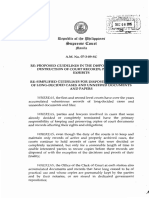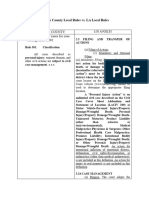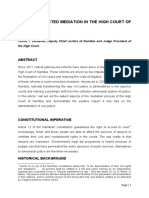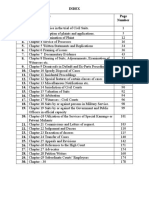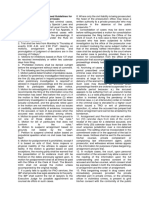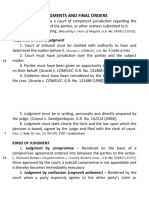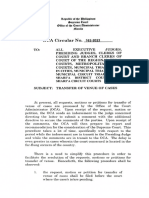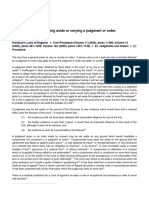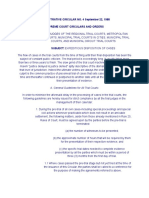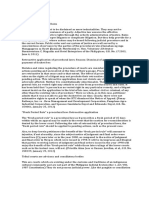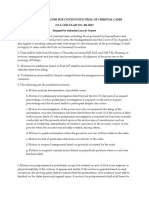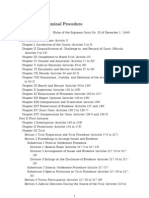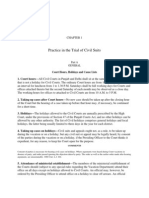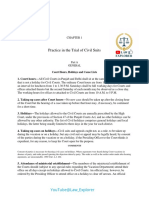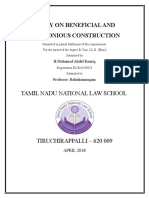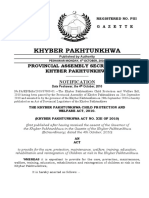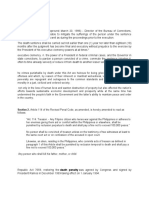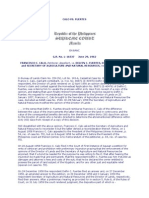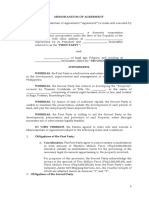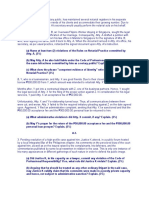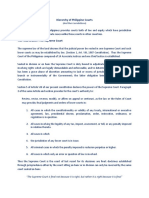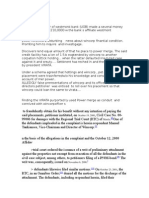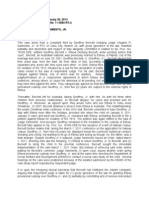Supreme Court of the Philippines
Philippine Judicial Academy
PHILJA Fax/Electronic Alerts
Issue 04-10
October 2004
OCA CIRCULAR No. 89-2004
TO: THE REGIONAL TRIAL COURTS, SHARI’A DISTRICT COURTS, METROPOLITAN TRIAL COURTS, MUNICIPAL
TRIAL COURTS IN CITIES, MUNICIPAL TRIAL COURTS, MUNICIPAL CIRCUIT TRIAL COURTS, AND THE
SHARI’A CIRCUIT COURTS
SUBJECT: REITERATION OF THE GUIDLEINES IN THE ARCHIVING OF CASES
It has come to the attention of the Office of the court Administrator that some judges are unfamiliar with, or even unaware of,
Administrative circular No. 7-A-92, dated 21 June 1993, pertaining to the guidelines in the archiving of cases.
For the guidance of all concerned, the following guidelines established in the said Administrative Circular are hereby restated:
I. CRIMINAL CASES
a) A criminal case may be archived only if after the issuance of the warrant of arrest, the accused remains at large for six (6)
months from the delivery of the warrant to the proper peace officer. An order archiving the case shall require the peace officer to explain
why the accused was not apprehended. The Court shall issue an alias warrant if the original warrant of arrest is returned by the peace
officer together with the report.
b) The court, motu proprio or upon motion of any party, may likewise archive a criminal case when proceedings therein are
ordered suspended for an indefinite period because:
1) the accused appears to be suffering from an unsound mental condition which effectively renders him unable to fully
understand the charge against him and to plead intelligently, or to undergo trial, and he has to be committed to a mental hospital;
2) a valid prejudicial question in a civil action is invoked during the pendency of the criminal case unless the civil and
the criminal cases are consolidated; and
3) an interlocutory order or incident in the criminal case is elevated to, and is pending resolution/decision for an
indefinite period before a higher court which has issued a temporary restraining order or writ of preliminary injunction; and
4) when the accused has jumped bail before arraignment and can not be arrested by the bondsman.
II. CIVIL CASES
In civil cases, the court may, motu proprio or upon motion, order that a civil case be archived only in the following instances:
(a) When the parties are in the process of settlement, in which case the proceedings may be suspended and the case
archived for a period not exceeding ninety (90) days. The case shall be included in the trial calendar on the day immediately following
the lapse of the suspension period.
(b) When an interlocutory order or incident in the civil case is elevated to and is pending resolution/decision for an
indefinite period before higher court which has issued a temporary restraining order or writ of preliminary injunction.
(c) When defendant without fault or neglect of plaintiff, can not be served with summons within six (6) months from
issuance of original summons.
GENERAL PROVISIONS
(a) Copies of the order archiving the case shall be furnished the parties.
(b) A special docket shall be maintained to record the cases, both criminal and civil, that have been archived.
(c) A periodic review of the archived cases shall be made by the Presiding Judge.
(d) The Presiding Judge shall, motu proprio or upon motion of any party, order the reinstatement/revival of an archived
case and its withdrawal from the archives whenever the same is ready for trial or further proceedings.
(e) The Branch Clerk of Court shall submit to the Office of the Court Administrator, a list of archived cases (stating the
reason/s for archiving the case) which shall be attached to the Monthly Reports of Cases (SC Form No. 1-2004), submitted monthly by
each court (A.C. No. 1-2001 dated January 2, 2001).
�PHILJA FAX/ELECTRONIC ALERTS OCTOBER 2004
Judges are directed to comply with the provisions of this circular and, accordingly, to archive cases which are covered by the
guidelines herein stated. In doing so, there will be less number of pending cases in the active docket which is, needless to state,
presently clogged.
Judges are likewise reminded that in accomplishing the Monthly Report of Cases (SC Form No. 1-2004), the archived cases
are to be deducted from the total number of cases pending at the end of the month. However, they are not considered in the
computation of the disposition rate of the judges.
Strict compliance with this Circular is hereby enjoined.
12 August 2004.
(Sgd.)PRESBITERO J. VELASCO, Jr.
Court Administrator
OCA CIRCULAR NO. 90-2004
TO: ALL TRIAL JUDGES
SUBJECT: A.M. NO. 04-5-19-SC RE: GUIDELINES IN THE INVENTORY AND ADJUDICATION OF CASES ASSIGNED TO
JUDGES WHO ARE PROMOTED OR TRANSFERRED TO OTHER BRANCHES IN THE SAME COURT LEVEL
OF THE JUDICIAL HIERARCHY
Quoted hereunder for your information and guidance, is the resolution of the Court En Banc dated June 8, 2004 in A.M. No.
04-5-19-SC, to wit:
“WHEREAS, Administrative Circular No. 3-94, issued on 26 January 1994 to amend
Administrative circular No. 1-94 dated 14 January 1994, provides for the guidelines in the distribution of
cases among reassigned judges and those of newly created branches, and Administrative Circular No. 5-
98 issued on 18 February 1998 in turn amends paragraph A of Administrative Circular No. 3-94;
WHEREAS, the said amended guidelines were further amended by the Resolution in A.M. No.
98-3-114-RTC entitled “Re: Cases Left Undecided by Judge Sergio D. Mabunay, RTC, Branch 24, Manila”
(354 Phil 698 [1998]); and
WHEREAS, notwithstanding said issuances, it has been observed that judges, who are
promoted or transferred to other stations, leave many undecided cases thereby unfairly creating additional
workload for judges who are subsequently appointed thereto.
NOW, THEREFORE, BE IT RESOLVED, as it is hereby Resolved, that in accordance with
Section 5 (3), Article VIII of the Constitution vesting this Court with the power to assign temporarily judges
of lower courts to other stations as public interest may require, and with Section 6 of the same article
mandating that this Court shall have administrative supervision over all courts and personnel thereof,
cases assigned to judges who have been transferred, detailed or assigned to any branch within or outside
the judicial region of the same court or promoted to a higher court shall be managed and decided under the
following guidelines:
1. All judges are enjoined to exercise judicial functions and responsibilities in accordance with the constitutional mandate of speedy
disposition of cases, the Code of Judicial Conduct, and the need to prevent clogging of court dockets, always keeping in mind that,
in the event of their transfer, detail or assignment to other branches of the same court within or outside the judicial region to which
they have been appointed, or promoted to a higher court, they shall have decided all cases raffled to them that are submitted for
decision.
2. Except as herein provided, all cases shall remain in the branch to which these have been raffled and assigned. Only cases that
have been submitted for decision or those past the trial stage, i.e. where all the parties have finished presenting their evidence, prior
to the transfer or promotion of the judge to which these are raffled/assigned shall be resolved or disposed by him/her in accordance
with the guidelines herein set forth.
3. A judge transferred, detailed or assigned to another branch shall be considered as Assisting Judge of the branch to which he was
previously assigned. However, except as herein below provided, the records of cases formerly assigned to him/her shall remain in
his/her former branch.
4. The judge who takes over the branch vacated by a transferred/detailed/assigned judge shall, upon assumption of duty and within
one (1) week, conduct an inventory of all pending cases in the branch. The inventory shall state the docket number, title and status
of each case. The inventory shall be submitted to the Office of the Court Administrator within five (5) working days from completion
thereof.
5. Should any case be left undecided by the transferred/detailed/assigned judge, the judge conducting the inventory shall cause the
issuance to the parties of a notice of transfer/detail/assignment of the judge to which the case had been assigned, with a directive
for the plaintiff/s to manifest, within five (5) days from receipt of such notice, whether or not he/she desires that the transferred judge
should decide the case. The desire of the plaintiff, who may opt to have the case decided by the new judge, shall be respected.
However, should the defendant oppose the manifestation of the plaintiff, the new judge shall resolve the matter in accordance with
these Guidelines. Should the plaintiff fail to submit such manifestation within the said 5-day period, the presumption is that he/she
desires that the case be decided by the transferred judge.
2
�PHILJA FAX/ELECTRONIC ALERTS OCTOBER 2004
6. The manifestation of the plaintiff that the case should be decided by the transferred judge shall be forwarded to the Office of the
Court Administrator which, upon receipt thereof, shall issue the proper directive. A directive requiring the transferred judge to
decide the case immediately shall state any of these conditions:
(a) If the new station of the transferred judge is within the province of the judicial region of his/her former station,
the case shall be decided in such station by the transferred judge who shall adjust his/her calendar to enable
him/her to dispose the undecided case at his/her own expense without sacrificing efficiency in the performance
of his/her duties in his/her new station.
(b) If the new station of the transferred judge is outside of the province in the judicial region of his/her former
station, the records of the undecided case shall be delivered either by personal service or by registered mail, to
the transferred judge and at his/her own expense.
If either case, the Office of the Court Administrator shall furnish the parties to the case with a copy of such directive and the
transferred judge shall return to his former branch the records of the case with the decision that the new judge shall promulgate in
his stead.
7. Should a motion for reconsideration of the decision or for new trial be filed by any party, the transferred judge shall resolve the
same. However if a motion for new trial is granted by the transferred judge, the new judge shall preside over the same, resolve the
motion, and see to its final disposition.
8. A judge who applies for transfer to another branch or for promotion shall submit to the Judicial and Bar Council a certification that
he/she has no pending undecided case submitted for decision at the time of the filing of his/her application. In no case shall a
promoted judge be allowed to take his oath of office and assume his/her new responsibilities unless and until he shall have issued
another certification manifesting that he has decided or disposed all cases assigned to him in his previous position.
This Resolution, which shall supersede all Resolutions, circulars and other issuances relative to the same subject
matter, shall be circularized to all courts. It shall take effect immediately.
Promulgated this 8th day of June 2004.”
August 11, 2004
(Sgd.)PRESBITERO J. VELASCO, Jr.
Court Administrator
Judges: Clerk of Court; complainant has the burden of proving his allegation
In administrative proceedings, the complainant has the burden of proving the allegations in his complaint with substantial
evidence. In the absence of evidence to the contrary, the presumption that the respondent has regularly performed his duties will
prevail. If a court employee is to be disciplined for a grave offense, the evidence against him should be competent and should be
derived from direct knowledge. While the desistance of witnesses themselves does not operate to divest the court from investigating a
matter involving its personnel, it is equally true that reliance on mere allegations, conjectures and suppositions will leave an
administrative complaint with no leg to stand on. Charges based on mere suspicion and speculation cannot be given credence.
Respondents cannot be faulted. Case against them was dismissed for lack of merit. (AM No. RTJ-04-1847, July 21, 2004)
Clerks of Court: Failure to transmit records to appellate court within 30 days after perfection of appeal
Section 12 of Rule 41 of the Rules of Court provides that the clerk of the trial court shall transmit to the appellate court the
original record or the approved record on appeal within 30 days from the perfection of appeal, together with the proof of payment of the
appellate court docket and other lawful fees, a certified true copy of the minutes of the proceedings, the order of approval, certificate of
correctness, the original documentary evidence referred to therein, and the original and three (3) copies of the transcripts. Copies of the
transcripts and certified true copies of the documentary evidence shall remain in the lower court for the examination of the parties.
Respondent is administratively liable for failure to transmit the records of Civil Case No. 11437 within the period allowed by the
rules for which he was fined P5,000.00. (AM No. MTJ-04-1545, May 27, 2004)
Chancellor, Philippine Judicial Academy
Ameurfina A. Melencio Herrera
Head, Research and Linkages Office
Prof. Sedfrey M. Candelaria
Editors
Dean Eulogia M. Cueva Atty. Orlando B. Cariño
Editorial Assistants Staff
Atty. Jack Andrew O. Miranda Romano A. Zapico
Atty. Amelia T. Guillamun Rodrigo G. Javier
Blythe M. Lumague
The PHILJA Fax/Electronic Alerts is issued monthly by the Research and Linkages Office of the
Philippine Judicial Academy with offices at the
3rd Floor of the Supreme Court Centennial Building, Taft Avenue, Manila. Tel No. (02)552-9518; Telefax; (02)552-9526
E-mail address: research_philja@yahoo.com
If you have any Fax No. or E-mail address, please let us know so we could send direct to you the “Alerts.”






